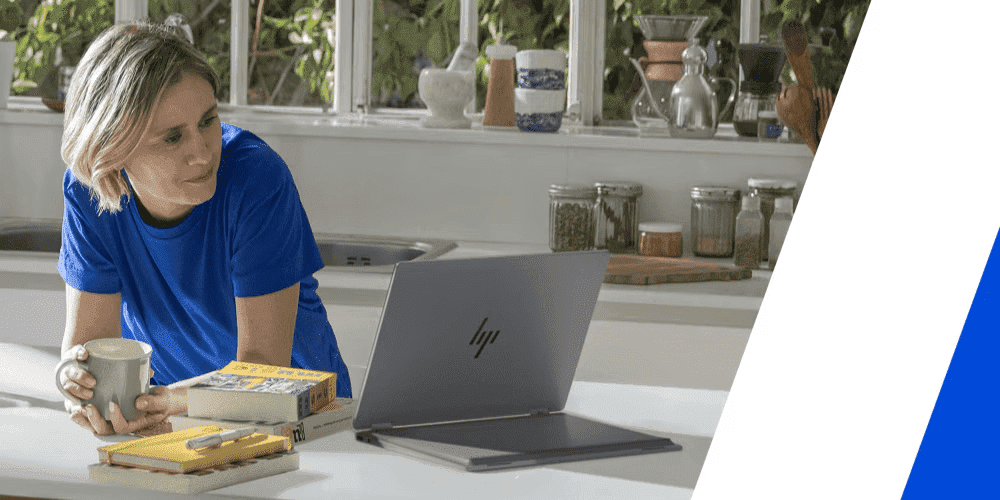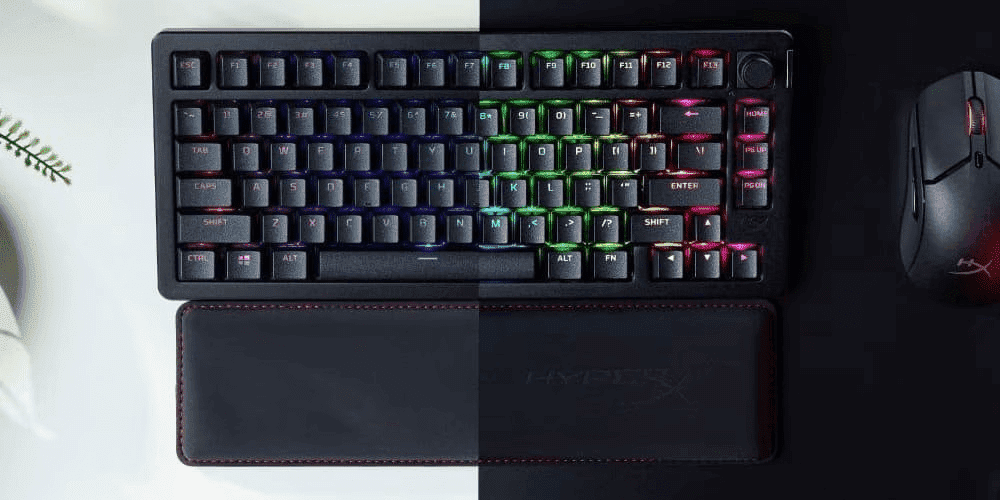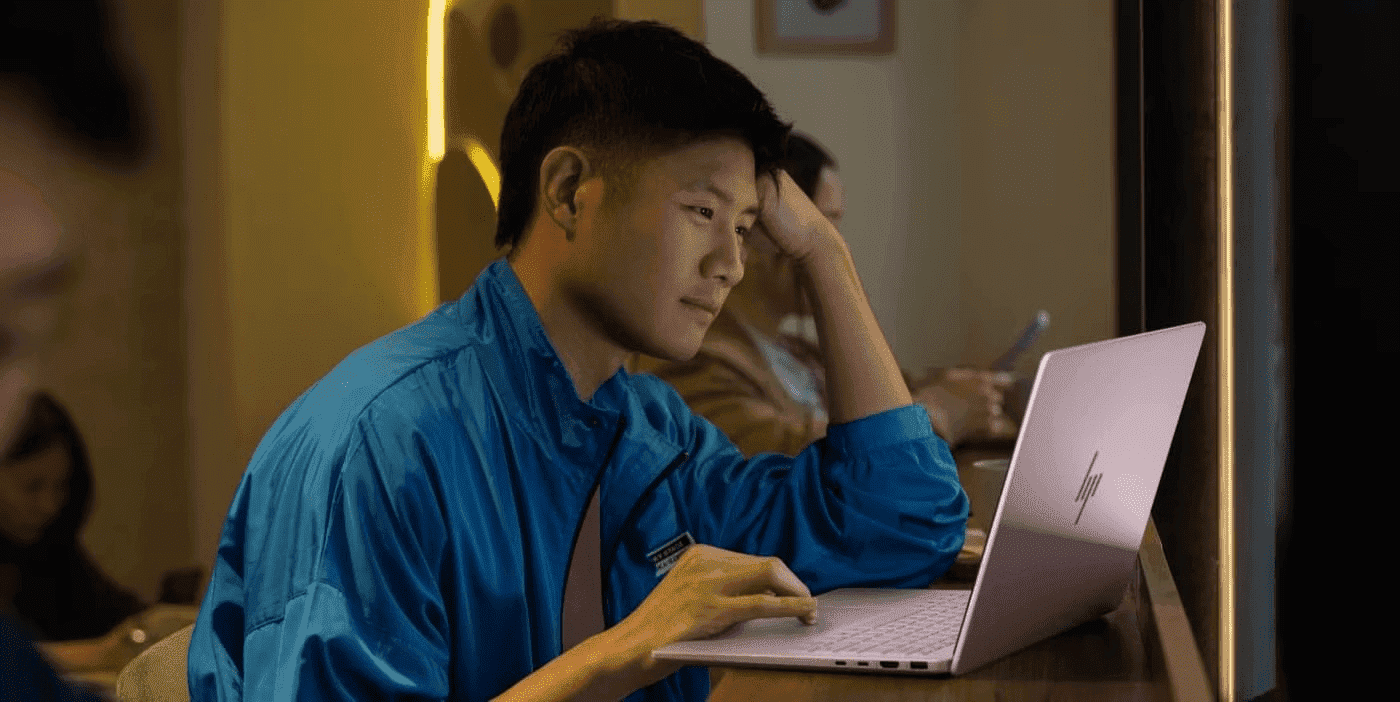Thank you for visiting the AUSTRALIA HP Store
-
Contact Us
CONTACT USCall us
- Sales
- 1300 540 516
- Technical support
- 13 23 47
Exc. public holidays
Chat with us- Our specialist are here to help
- Live Product Demo
- Sales
- 61288061500 (WhatsApp)
-

- Post Sales
- 61288061700(WhatsApp)
Exc. public holidays
Live product demo
Submit feedback We value your opinion! - My Account
Search
HP Computers Made with Ocean Bound Plastics

Posted:
September 21, 2023

Each year, 8 million metric tons of discarded water bottles and other plastic litter blankets our ocean floors and circulates through ocean currents – that’s equivalent to the weight of 57,000 blue whales. What’s more, that single-use plastic bottle someone just purchased will take 450 years to decompose.
But all is not lost. Some companies, like HP, are stepping in to help. Because of the overwhelming global plastic pollution problem, HP is working to divert ocean-bound plastic into our circular supply chain, where it can be recycled into new, high value products.
Contents
- Recycling can make an impact
- What are ocean-bound plastics and why do they matter?
- Planet, people, and community
- Partnering globally to increase the impact of sustainability
- HP and the history of sustainable tech
- HP’s efforts are making an impact
- HP products made with ocean-bound plastic
- Computers
- 1. HP Elite Dragonfly laptop with touchscreen
- 2. HP ZBook Create and ZBook Studio notebooks
- 3. HP ENVY series laptops
- 4. HP Elite c1030 Chromebook Enterprise Edition
- Monitors
- 5. HP E24d G4 & HP E27d G4 Advanced Docking monitors
- HP Renew Series
- 6. HP Renew backpack
- 7. HP Renew Slim briefcase
- Committing to a more sustainable planet
Recycling can make an impact
Imagine you are headed out to your local trail for a hike. You forgot to bring water so, on the way, you stop by a gas station to pick up a plastic bottle of water. You know that plastic is harmful to the environment, but you decide that it’s okay to purchase a single-use bottle since you’re an avid recycler.
While many people take comfort in their recycling habits, sadly only 9% of plastic waste is recycled globally. What happens to the rest? In many cases, the surplus makes its way over time into the ocean causing death and disruption to marine life.
Each country prioritizes recycling differently, and in developing countries like Haiti, plastic pollution is an ongoing issue. Here, plastic bottles in particular visibly litter the land and waterways in some areas due to a lack of a proper waste management system. And while the U.S. is one of the world’s biggest plastic waste producers, much of our garbage has been shipped overseas to China and other developing countries, allowing us to close our eyes to the problem.
HP is determined to reduce the amount of ocean-bound plastics globally by incorporating them into new products, a win for both consumers and the environment.
What are ocean-bound plastics and why do they matter?
Ocean-bound plastics are any plastic products found within 30 miles (50 kilometers) of a waterway or coastal area that have not been collected and are not likely to be, according to NextWave Plastics, an HP partner. Much of that waste finds its way into the water, putting sea life and their habitat at risk.
Once any piece of single-use plastic reaches the ocean, it’s almost impossible to collect it. That’s why HP is working to keep plastic from reaching the ocean in the first place. HP’s goal is to take plastic that would otherwise end up in the ocean and upcycle it to create new HP hardware and print supplies through our HP Planet Partners recycling program.
Planet, people, and community
But HP’s Sustainable Impact efforts incorporate more than just recycling. Environmental issues are only one part of HP’s Sustainable Impact strategy. The other two tenets are people and community. In the push for a more equitable planet, human rights and dignity are vital as we pursue creating a sustainable recycling system.
ENGAGING THE LOCAL COMMUNITY IN HAITI
Collaboration between HP and First Mile has created 1,100 new employment opportunities in Haiti while addressing the problem of ocean-bound plastics. So how does a company that employs nearly 60,000 people worldwide devise a sustainability plan that is both effective and ethical?
The program hires local citizens to provide them with a meaningful income while also diverting waste into HP products to create more sustainable products.
Many families in Haiti rely on plastic collection as a source of income. For example, Rosette is a woman from Haiti with five children to care for. After losing her husband in the 2010 earthquake, Rosette’s family became homeless. Now she runs a collection business that gathers bottles for use in the HP supply chain, helping address plastic pollution in her community while providing the materials HP needs for their products. This income helps Rosette pay her rent, buy food, and keep her kids in school.
HP also partners with First Mile and WORK in Haiti to offer educational opportunities, access to healthcare, safety workshops, and job training and placement. With its partners, HP has established two schools equipped with HP technology serving 150 children.
The reduction of ocean-bound plastics goes hand-in-hand with providing opportunities to support the communities impacted, creating a cycle of renewal and rebuilding.
Partnering globally to increase the impact of sustainability
The crusade to move to more sustainable technology is not a simple one. HP partners with NextWave Plastics, an organization that helps multinational companies facilitate ocean-bound supply chains. HP is one of the first major corporations committed to developing a global network of ocean-bound plastic supply chains.
Other companies include IKEA, Dell, and General Motors. Together we help orchestrate collective action among large corporations to amplify the United Nations Sustainable Development Goal 14.1, which focuses on preserving life below water.
HP and the history of sustainable tech
Although HP began their sustainability journey as early as 1940, when HP recorded its first charitable donation, HP Planet Partners was created in 1991 to demonstrate the company’s commitment to create a more sustainable planet and create a low-carbon, circular economy.
In the years since, HP has kept 875 million HP printer cartridges, 114 million apparel hangers, and 4.69 billion post-consumer plastic bottles out of landfills. Instead, we upcycle them to make new HP products. As a result, Newsweek recognized HP in 2021 with the top spot on its ‘America’s Most Responsible Companies’ list for the second year in a row.
HP’s efforts are making an impact
HP has used more than 60 million plastic bottles from Haiti in our products since the initiative began in 2016. Ink cartridges, computer monitors, and tote bags have all leveraged recycled plastic materials, with exciting new products continually launching. Although this sounds like a small dent, that’s over 1.7 million pounds of plastic that will not go into the ocean, because it’s, instead, going into the tech products you use.
While a computer made up of your old water bottle sounds odd, there are stringent industry standards in place to ensure both high quality and lower environmental impact. The Green Electronics Council manages the EPEAT verification process and is the global ecolabel for the IT sector.
They are an independent nonprofit which verifies that manufacturers are meeting firm criteria and industry standards. 72% of HP products shipping in 2019 were EPEAT® registered, and 21% were EPEAT Gold rated.
HP products made with ocean-bound plastic
As consumers grow increasingly aware of their purchasing habits and their impact on the environment, HP continues to build out its portfolio of sustainable products. Savvy consumers can participate by purchasing products that utilize ocean-bound plastics. Here is a sampling of those products.
Computers
1. HP Elite Dragonfly laptop with touchscreen


This is the first-ever computer to use ocean-bound plastic for the speakers and bezels. Light and durable, the 13-inch HP Dragonfly x360 has a long battery life so you can work from anywhere, switching between tablet, laptop, and tent mode for ultimate flexibility.
Keep your info secure with multi-factor authentication, a privacy camera, and an integrated privacy screen. Choose between 8th Generation Intel® Core® i3, i5, or i7 CPU and up to 2TB of SSD storage.
2. HP ZBook Create and ZBook Studio notebooks


Made with materials that meet GreenScreen for Safer Chemicals methodology, HP ZBook products may help the environment, but that doesn’t mean you have to give up computing power or mobility.
With NVIDIA GeForce RTX graphics and Intel Core i9 CPU, HP ZBooks offer power users the best of all worlds. Customize your 15-inch notebook PC with as much memory and storage as you need. You also have the choice between a Full High Definition (FHD) and 4K display for your visual projects. Creative pros from 3D artists to video editors to VR developers love this versatile, environmentally-friendly laptop.
3. HP ENVY series laptops


Whether you choose the HP ENVY x360 convertible laptop or the standard clamshell configuration of the HP ENVY, you can count on power and performance. Choose between NVIDIA, Intel Iris Xe, or AMD Ryzen 4000 graphics, memory up to 32GB, and storage up to 512GB SSD and 32GB of Intel Optane.
4. HP Elite c1030 Chromebook Enterprise Edition


The world’s first Chromebook made with ocean-bound plastics, this ultrathin all-aluminum HP Chromebook lets you minimize your footprint with Chrome OS and cloud storage. Enhanced bio-metric security along with AI-backed threat protection means malware won’t derail you. Plus, a wide-view angle HD camera and Audio by Bang & Olufsen lets you easily collaborate for work or school.
Monitors
5. HP E24d G4 & HP E27d G4 Advanced Docking monitors


Another world’s first from HP, these 2 monitors are crafted using ocean-bound recycled plastics. But helping the environment doesn’t mean you have to sacrifice in your day-to-day computing.
Available in 24-inch or 27-inch diagonal sizes, the clutter-reducing HP G4 Advanced Docking Monitors let you connect, charge, and power your PC or laptop with a single connection. Log in with face recognition, too, while your laptop lid stays closed.
HP Renew Series
6. HP Renew backpack


Made from shredded recycled plastics that are spun into yarn, this comfortable and durable backpack will keep your laptop secure, your valuables organized, and your most-used item accessible.
7. HP Renew Slim briefcase


This slim, water-resistant case, made completely with recycled materials, will keep you and your tech on the move rain or shine. Weighing in at only 0.84 lbs, you can carry it by the handles or swing it over your shoulders for an ergonomic dash to your next meeting. Need a bigger case? Try the HP Recycled Series 15.6-inch Top Load case.
Committing to a more sustainable planet
HP includes ocean-bound plastics in all of our new HP Elite and HP Pro desktop and laptop computers launched in the last year. And we will continue to push forward to increase the use of recycled materials.
Experts predict that items made with ocean plastics will outweigh all the ocean’s fish by 2050. And while some people have an ‘out of sight, out of mind’ approach to plastic consumption, HP is doing something now to shift the planet’s disrupted ecosystem by prioritizing a circular, low-carbon economy.
HP recognizes the urgency and continues to find new and innovative ways to help preserve our planet. So the next time you go for a hike, bring your reusable bottle water with you. And when you shop for your next computer, consider repurposing the single-use plastics that HP has incorporated into our laptops, computer monitors, and accessories.
Comment(s)
Products purchased through this store are sold and fulfilled by Ingram Micro Pty Limited
CONTACT US
Call us
- Sales
- 1300 540 516
- Technical support
- 13 23 47
Exc. public holidays
Chat with us
- Our specialist are here to help
- Live Product Demo
- Sales
- 61288061500 (WhatsApp)
-

- Post Sales
- 61288061700(WhatsApp)
Exc. public holidays
Live product demo
Submit feedback
We value your opinion!








